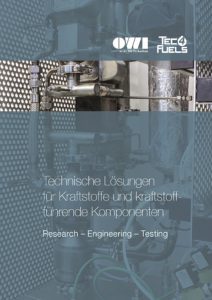Fuels and Lubricants
… in Interaction with Technical Components

Fuel samples are being tested. Photo: OWI
Research in the field of energy carriers at OWI is concerned with the characteristics of liquid fossil and renewable fuels and lubricants and their applications in technical systems, for instance in motor vehicles, combined heat and power plants or heating systems. The focus of several research projects at OWI lies in particular on the physical-chemical properties of new, renewable fuels as well as on their effects on technical systems and components. Against the background of the required greenhouse gas reduction and to develop alternative fuels especially for the transport sector, further research areas exist. Besides, higher distances and lower resistances should be realised by the development of innovative lubricants.
Depending on the feedstock, the origin and the method of production, alternative fuels can differ significantly in their physical-chemical properties which depend on the available mixing ratio. Moreover, possible interdependencies with additives have to be taken into consideration. Considered are already marketable fuels, such as biodiesel, biogenic heating oil and bioethanol, as well as possible alternatives like methanol and butanol as well as long chain alcohols, hydrogenated vegetable oil (HVO) or XtL (BtL – Biomass-to-Liquid, PtL – Power-to-Liquid; Gas-to-Liquid).
The technical components of motor vehicles or heating systems can be affected and lead to changes sooner or later. These changes are likely to occur in the case of older systems depending on the type of material and the type of design. Moreover, there are possibilities of changes concerning the emission of pollutants (CO, CO2, NOx, carbon black). Hence, not only the interactions between the different chemical compositions of the fuels are examined at OWI, but also always the connections and interactions of the liquid hydrocarbons with the combustion technologies and their materials. In doing so, the influence of innovative fuels on the fuel leading components can for instance be measured at special test benches. Beyond that, OWI takes the production methods of fuels and their availability as well as the technical and economic framework conditions of their production into consideration.

A folder summarises the offer in the area of fuel-handling components in mobile and stationary automotive applications.
OWI and its parent company TEC4FUELS GmbH, support companies in their activities of research and development and testing. Working in the areas of fuels and technical components for fuel conveying parts, they offer intelligent technical solutions that help you to save time and money. OWI and TEC4FUELS are specialists in providing intelligent solutions for complex questions resulting from the interaction between conventional and renewable fuels with fuel-handling components in mobile and stationary automotive applications. Their services include technical consulting, research, engineering and development, as well as the testing of fuels and lubricants, components and systems. A folder summarises the offer of OWI and TEC4FUELS in this area. You find it here to the download.
OWI contributes actively to the following committees and working groups for the quality management of fuels:
- DGMK: Expert committee fuels
- Technical committee of AGQM Biodiesel e. V.
- FAM – Expert committee for standardisation of mineral oil and fuel
- FAM – Greases: Requirements and testing (NA 062-06-52 AA)
- DECHEMA specialist group “Alternative liquid and gaseous fuels” (FG-AKB)
